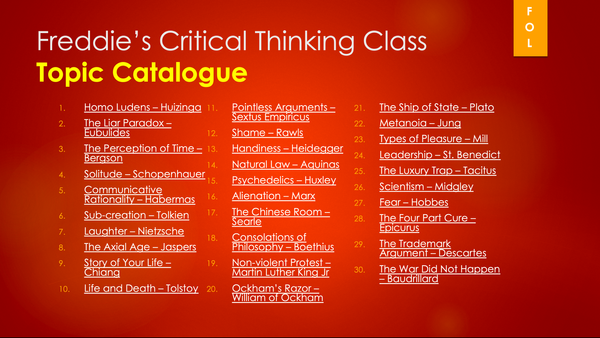0

Critical Thinking [B2+]
5 years agoCritical Thinking in English
Are you interested in big ideas, influential authors and interesting discussions?
Framing the issue
My students frequently complain that higher-level exams such as IELTS, FCE, CAE, and CPE are actually testing critical thinking, in addition to English language skills. They may have a point but critical thinking skills are highly useful themselves. Why not study both together and get two for the price of one? So, study critical thinking!
What exactly is critical thinking?
Critical thinking is ‘thinking about thinking’. It’s the intellectual process of actively and skilfully developing reasoning. Key critical thinking skills include: observation, experience, reflection, open-mindedness, self-reflexivity, interpretation, inference, explanation, analysis, problem-solving, and decision making.
Why study critical thinking?
There is plenty of academic support for such an approach. Studying critical thinking in English is a form of CLIL (Content and Language Integrated Learning) which also commands significant academic support. Here, elements of philosophy and philosophical enquiry have been incorporated as a means of boosting critical thinking. Below, I have selected some of the most influential ideas and thoughts in the field as you can see. Please note: full references are available on request.
"[Critical thinking entails] teaching conceptual content by means of procedural choices (cognitive skills) using specific language derived from the discourse context.” (Ball, Kelly & Clegg, 2015)
“I suggest that in an education fit for the twenty-first century we need to shift the balance more towards the processes of understanding rather than emphasise the acquisition of knowledge alone.” (Hennam, 2006)
"This critical review of controlled studies evaluating the outcomes... [of critical thinking] shows a wide range of evidence for positive outcomes from different countries with different age groups." (Trickey & Topping, 2004)
“It is our view that both language and content are actually vehicles for the development of subject competences [critical thinking] and that language and content are never, as it were, aims in themselves... namely the efficient development of subject competences.” (Ball, Kelly & Clegg, 2015)
So, what does this all mean?
Critical thinking (and enquiry), in a practical sense, allows for interesting learner-centred discussion-based lessons. These often include lively debates and discussion in class; in addition to meaningful engagement with influential ideas and even ultimate questions (e.g. regarding matters of existence, life and death). As well as improving students’ oral and written abilities, it is also well suited for developing argument skills which is useful both for English exams, university study, and in many potential future careers.
How does it actually work in the (online) classroom?
I have developed a new course covering all of the above. The concept is really quite simple: short articles – big ideas – interesting discussion. Classes will be delivered using interactive and engaging PowerPoint presentations. Choose a topic from a wide list of interesting ideas. Each topic has its own short article containing a big idea by an influential author or thinker. This article can be sent to you in advance or read quickly at the start of the class to suit you and your schedule. You will then have the opportunity to ask any questions about the vocabulary or language content. Then, we discuss the article together working our way through a series of structured questions. Afterwards, personalised feedback will be issued and you can then choose the next topic.
Topic options include:

Please send me a direct message for more information.
